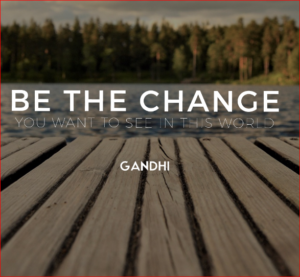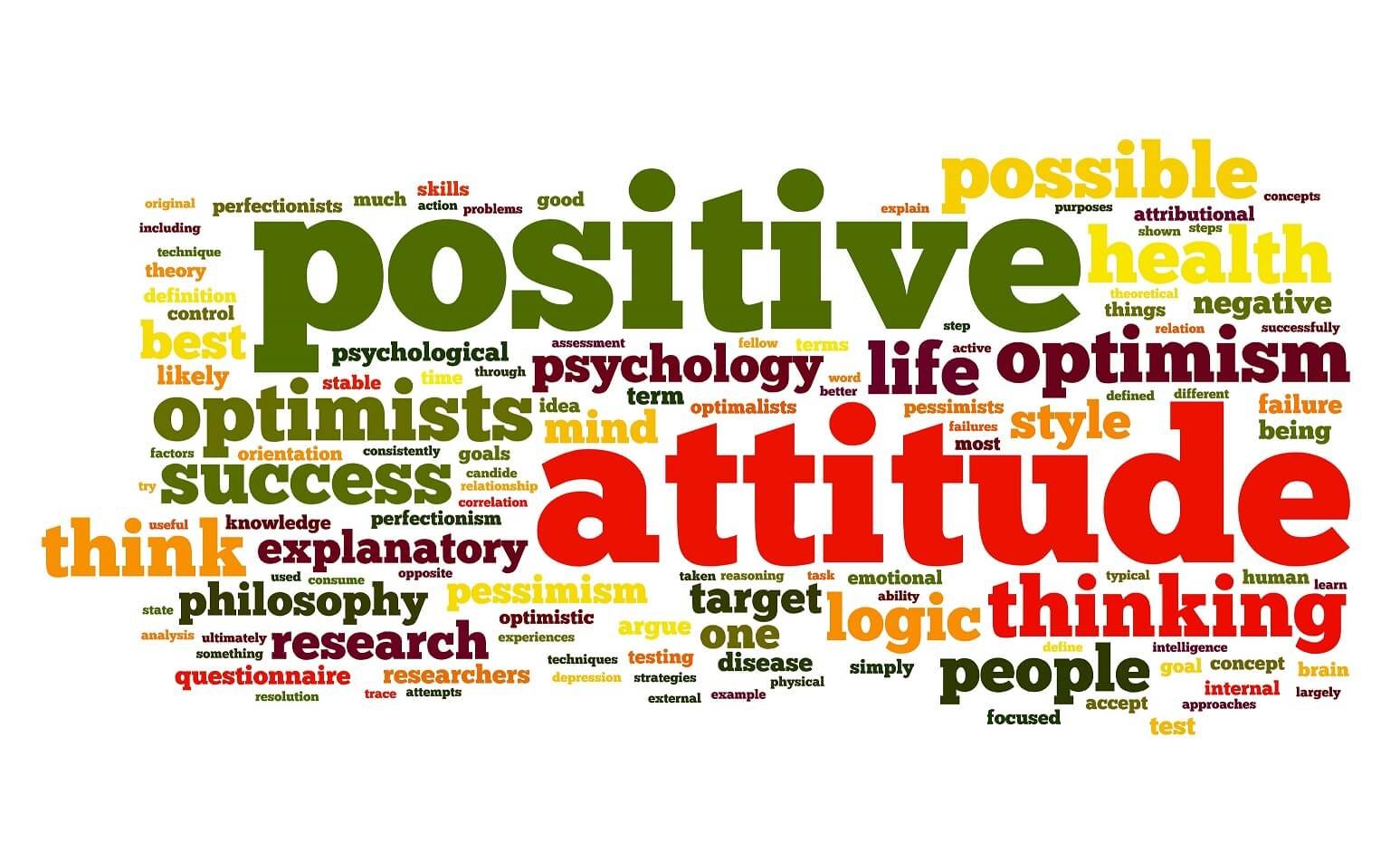POSITIVE ATTITUDE
POSITIVE ATTITUDE. An attitude is a positive, negative, or mixed evaluation of an object that is expressed at some level of intensity. It usually implies feelings that are either positive or negative. Attitudes are our established ways of responding to people and situations that we have learned based on the beliefs, values, and assumptions we hold and our life experiences. Our attitude towards a person or event is displaced through our behavior as a result of interaction
with that person.
A person’s attitude represents how he or she feels about something or their state of mind.
- Example:
- If one can have a good (or positive) attitude toward their work, it means they feel good about their work, their job, their organization, etc.
- If one can have a bad (or negative) attitude, it means they dislike their environment no matter what is going around them.
CONCEPT OF ATTITUDE:
- The concept of attitude occupies a very favored position in social psychology and is considered very important for every individual who wants success in their life.
- Attitudes are evaluative statements, either favorable or unfavorable, concerning objects, people or events.
- They reflect how one feels about something.
- Example:
- When you say “I like Mathematics”, you are expressing your attitude towards the subject of mathematics.
THREE CONCEPTS OF ATTITUDE:
1. Cognitive Attitude:
- Our belief in something is the cognitive attitude.
- Example: “Gender discrimination is widespread” – This is an opinion which evaluates the topic of discrimation based on gender.
2. Affective Attitude:
- It is the emotional or feeling segment of attitude.
- Example: “I don’t like Jon because he discriminates against minorities.”
3. Behavioural attitude:
- It refers to an intention to behave in a certain way toward someone or something.
- Example:
- Employees working in an organisation commonly can follow certain behaviour for the purpose of betterment of the organisation
SIGNIFICANCE OR IMPORTANCE OF ATTITUDE:
- Attitude plays a very important role for achieving the success.
- It is more important than education, money, knowledge, intelligence, talents or skills.
- It applies to every sphere of life, including one’s personal and professional life.
- Can an executive be a good executive without a good attitude?
- Can a student be a good student without a good attitude?
- Can a parent, teacher, salesman, employer, employee be good in their roles without a good attitude?
- The foundation of success regardless of your chosen field is attitude.
- If attitude is such a critical factor in success, shouldn’t you examine your attitude toward life and ask how your attitude will affect your goals?
Example:
- Journalists, friends, armed forces, Specialists, and even their father laughed at an idea of an airplane proposed by Orville Wright and Wilbur Wright (Wright brothers).
- Many people told, “What a silly and insane way to spend money?” “Only birds can fly. Machines cannot fly!”
- The Wright brothers responded we have a dream and we can make it happen”.
- As a result, airplanes were invented.
- This shows the importance of attitude towards success.
FACTORS AFFECTING ATTITUDE:
- There are primarily three factors that determine our attitude.
- They are:
- 1. Environment
- 2. Experience
- 3. Education
- These are called the triple Es of attitude.
- Let’s evaluate each of the factors individually.
1. Environment
- Environment consists of the following:
- Home: Parents, Siblings, relatives, Neighbours and friends.
- School: Teachers, school staff, seniors, juniors.
- Work place: Colleagues, superiors and subordinates.
- Media: Television, newspapers, magazines, radio, movies
- Cultural background
- Religious background
- Traditions and beliefs
- Social environment
- Political environment
All of these environments create a culture.
- Every place, a home, organization or a country has a culture.
- In countries where the government and political environment is honest, generally you will find that the people are honest, law abiding and helpful.
- And the reverse is true too.
- In a corrupt environment, an honest person has a tough time whereas in an honest environment, the corrupt one has a tough time.
- In a positive environment, a marginal performer’s output goes up.
- In a negative environment, a good performer’s output goes down.
2. Experiences:
- Our behaviour changes according to our experiences with people and events in our life. If we have a positive experience with a person, our attitude toward him becomes positive and vice versa.
3. Education:
- It refers to both formal and informal education, not just academic qualifications.
- Knowledge strategically applied translates into wisdom, ensuring success.
- Education makes the role of the educator vital.
- A teacher affects eternity.
- The ripple effect is immeasurable.
- We are drowning in information but starving for knowledge and wisdom.
- Education ought to teach us not only how to make a living but also how to live.
POSITIVE ATTITUDE:
- A positive attitude helps you to cope more easily with the daily affairs of life.
- It brings optimism into your life and makes it easier to avoid worry and negative thinking.
- It will bring constructive changes into your life and make you happier, brighter and more successful.
- People with positive attitudes have certain personality traits that are easy to recognize.
- They are caring, confident, patient, and humble.
- They have high expectations of themselves and others.
- They anticipate positive outcomes.
- A person with a positive attitude is like a fruit of all seasons.
- He is always welcome.
The Benefits of a Positive Attitude:
- These are many and easy to see.
- But what is easy to see is also easy to miss.
- To mention a few, a positive attitude
- increases productivity
- fosters teamwork
- solves problems
- improves quality
- makes for congenial atmosphere
- breeds loyalty
- increases profits
- fosters better relationships with employers, employees, and customers
- reduces stress
- helps a person become a contributing member of society and an asset to their country
- makes for a pleasing personality
Steps to build a Positive Attitude:
- Step 1: Changing the Focus and Looking for the Positive:
- We need to become good finders.
- We need to focus on the positive in life.
- Let’s start looking for what is right in a person or situation instead of looking for what is wrong.
- Even in paradise, fault finders will find faults.
- Most people find what they are looking for.
- If they are looking for friendship, happiness, and the positive, that is what they get.
- If they are looking for fights or indifference, then that is what they get.
- Looking for the positive does not mean overlooking faults.
Step 2: Making a Habit of Doing It Now:
- We have all procrastinated at some time in our lives.
- Procrastination leads to a negative attitude.
- The habit of procrastination fatigues you more than the effort it takes to do it.
- A completed task is fulfilling and energizing; an incomplete task drains energy like a leak from a tank.
- If you want to build and maintain a positive attitude, get into the habit of living in the present and doing it now.
Step 3: Developing an Attitude of Gratitude:
- Count your blessings, not your troubles.
- Take time to smell the roses.
- It is not uncommon to hear that someone, because of an accident or illness, became blind or paralyzed but won a million dollars in settlement.
- How many of us would like to trade places with that person?
- Not many.
- We are so focused on complaining about things we don’t have that we lose sight of the things we have.
- There is a lot to be thankful for.
Step 4: Getting into a Continuous Education Program:
- Let’s get some myths out of the way.
- It is a general belief that we get educated in schools and colleges.
- “Do we really get educated in schools and colleges?”
- Generally, there is a consensus that some do but most don’t.
- We receive a lot of information in schools and colleges and that alone is not needed in achieving our goals.
- We do need the information to be educated.
- But we need to know the true meaning of education.
Step 5: Building a Positive Self-Esteem:
- Self-esteem is the way we feel about ourselves.
- When we feel good within, our performance goes up, our relationships improve both at home and at work.
- The world looks nicer.
- What is the reason?
- There is a direct correlation between feeling and behaviour.
Step 6: Staying away from Negative Influences:
- Today’s teenagers learn from adult behaviour and the media.
- They face peer pressure.
- Peer pressure is not just limited to teenagers; it is also prevalent in adults.
- It shows a lack of self-esteem when people do not have the courage to say “No, thank you,” and stay away from negative influences:
- What are the negative influences?
NEGATIVE ATTITUDE:
- People with negative attitudes will blame the whole world, their parents, teachers, spouse, the economy, and the government for their failures.
- Some people criticize no matter what.
- It does not matter which side you are on, they are always on the other side.
- They have made a career out of criticizing.
- They are “career critics.”
- They criticize as if they will win a prize at a contest.
- They will find fault with every person and every situation.
- You will find people like this in every home, family, office.
- They go around finding fault and telling everybody how bad things are and blaming the whole world for their problems.
- All that they are doing is causing more tension for themselves and for others around them.
- They spread negative messages like a plague and create an environment conducive to negative results.
- Some people always look at the negative side.
Who are pessimists?
- Pessimists-
- are unhappy when they have no troubles speaking,
- feel bad when they feel good, for fear they will feel worse when they feel better,
- spend most of their life at complaint counters,
- always turn out the lights to see how dark it is,
- are always looking for cracks in the mirror of life,
- stop sleeping in bed when they hear that more people die in bed than anywhere else,
- cannot enjoy their health because they think they may be sick tomorrow,
- not only expect the worst but make the worst of whatever happens,
- don’t see the doughnut, only the hole,
- believe that the sun shines only to cast shadows,
- forget their blessings and count their troubles,
- know that hard work never hurts anyone but believe “why to take a chance?”
DIFFERENCES BETWEEN NEGATIVE AND POSITIVE ATTITUDES.
Negative attitude personality
- They are always part of the problem,
- They always have an excuse,
- Sees a problem with every answer.
- Says “It may be possible but it is too difficult”.
- Says “It was not my fault.
- Always apart from the team
- Sees only problems.
- Says “Life is hard”.
- Thinks “People are worst”.
- Always hates the workplace.
- They are mostly losers.
- Always looks on the negative side.
- They are always angry, frustrated, and stressed.
- Always says “Impossible”.
- Says “I can’t do”.
Positive attitude personality
- They are always part of the answer.
- They always have a program.
- Sees an answer for every problem.
- Says “It may be difficult but it is possible”.
- Says “I was wrong”.
- Always a part of the team.
- Sees all possibilities.
- Says “Life is filled with experiences”.
- Thinks “Good people are there”.
- Always work with lovely people.
- They are mostly winners.
- Always looks on the positive side.
- They are always happier, polite, and lovable.
- Always says “Possible”.
- Says “I can do”.






